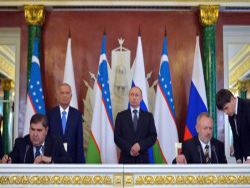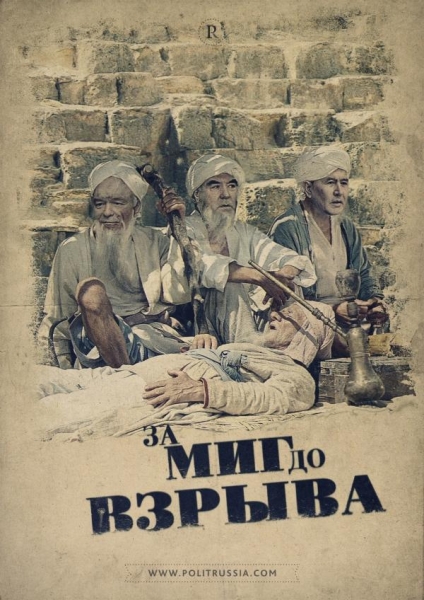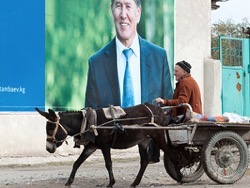
The results of the official visit of the President of Uzbekistan Islam Karimov to Moscow has caused a lot of positive comments from the experts about the current state and prospects of development of Russian-Uzbek relations. Political and economic cooperation between the two countries in recent years really is developing rapidly, which allows to look optimistically into the future. However, it was not always so, and even just a few years ago, relations between Moscow and Tashkent was going through not the best times.
Unlike most States of Central Asia, Uzbekistan has always held a special position regarding the participation in various integration associations that occurred in the former Soviet Union. Despite the fact that Tashkent was at the forefront of the prisoner in the 1992 Treaty on collective security of CIS countries in 1999 he withdrew from the CSTO. Until 2006, Uzbekistan participated in the activities of GUUAM – an anti-Russian bloc, which also included Georgia, Ukraine, Azerbaijan and Moldova. In August 2006, after the suppression of riots in Andijan, Republic, which was isolated from the West, rejoined the CSTO. However, the attempts of Russia and other members of the organization to strengthen cooperation in the defense sector met the constant opposition of Tashkent. Uzbekistan did not take part in meetings of heads of States and defense Ministers of the CSTO, did not sign any documents, opposed the use of the Collective rapid response forces (CRRF) for the settlement of crisis situations and refrain from the coordination of the CSTO with the SCO and the OSCE.
In June 2012, for example, Uzbekistan, as a member of the CSTO, refused to pass through its territory of military equipment to Kazakhstan, EN route to participate in the exercises of the SCO “Peace mission-2012” in the Sogd oblast of Tajikistan. In the end, the technique had to be delivered through the territory of Kyrgyzstan. It is not surprising that in the same month, Tashkent suspended its participation in the activities of the organization, and in December 2012, his application was accepted at the summit of the collective security Council of CSTO. And was not suspended the participation and membership of Tashkent in the CSTO, which deprived him of the opportunity to ignore decisions of the organization because of its lack of its representative. In addition, the summit deprived Uzbekistan of the possibility of “preferential” option return to the ranks of the organization, ruling that if the Tashkent decides to rejoin the CSTO, he would first have to ratify all the agreements signed in his absence.
When you consider that the membership prior to the Customs Union of the EurAsEC Uzbekistan refused back in 2008, it will become obvious that the country adheres to a kind of policy of neutrality, not declared, as in Turkmenistan, officially.
Withdrawal from the CSTO, the first on population and second in economic potential of the countries of the region, has also extremely important from a strategic point of view of geographical position, Moscow is not happy. But she somehow was forced to consider the position of Tashkent came to building relations on a bilateral basis. Their legal basis was concluded in November 2005, the Treaty of Alliance, providing for military assistance in the event of external aggression against one of the parties. The existence of this Treaty served as a deterrent during the numerous boundary and water conflicts with Uzbekistan, Tajikistan and Kyrgyzstan. Being a member of CSTO, Bishkek and Dushanbe, in the event of a military conflict with Tashkent, could count on Moscow’s help. But it is theoretically supposed to, and the Uzbekistan. The resulting system of contracts hampered the ability of escalating numerous conflicts between the Central Asian States in the security field.
The beginning of the “tenth” years was generally for Russian-Uzbek relations difficult period. On the eve of the withdrawal of Uzbekistan from the CSTO to the Republic of frequent visits by high-ranking American and British military and diplomats. The intensity of diplomatic contacts with Tashkent in this period has increased dramatically. In the summer of 2012, the media began to circulate rumors that the U.S. plans to deploy in the Republic military base, moving there part withdrawn from Afghanistan troops, engineering and intelligence infrastructure. In August 2012, this was announced by Kazakhstan, and after them and Russian sources. According to them, Washington and Tashkent were in negotiations about placing in a Republic military facility, intended to coordinate action in case of aggravation of the situation after the planned 2014 withdrawal of US troops from Afghanistan. Since the Uzbekistan legislation, accommodation of foreign military bases on the territory of the country was forbidden to call his plan a Center for rapid response. In fact, he had become the largest military installation of the United States in the region. At the same time Washington took the initiative to give the Central Asian countries exported part of Afghanistan military vehicles and equipment.
Moscow, for its part, has proposed to modernize the army of Kyrgyzstan and Tajikistan, giving them extensive assistance with equipment and weapons, as well as intensified the issue of construction in Kyrgyzstan HPP “Kambarata-1 and Verhneuralskogo of hydroelectric power, caused a nervous reaction of Tashkent.
Regulation of river flow in the arid and hot region, a large part of the population which lives in rural areas and depends critically on irrigation and drinking water, is an instrument of political and economic pressure.
Similar methods are used and Tashkent itself, which is repeatedly continued delivery of natural gas to Kyrgyzstan and Tajikistan. As a consequence, in the triangle Uzbekistan-Kyrgyzstan-Tajikistan grew a tangle of contradictions, which threatened the conflict escalate into the armed phase. “The situation may escalate to such an extent that it is likely that everyone will come not only to confrontation but also to war,” – said Islam Karimov in September 2012, during an official visit to Kazakhstan. In such a conflict inevitably would be drawn, and Russia, as a CSTO member. However, a negative scenario then managed to escape, and Moscow’s relations with Tashkent gradually improved.
Normalization of Russian-Uzbek relations was facilitated by several circumstances. From the deployment of American military facilities on its territory of Uzbekistan in the end refused, that was fine with Moscow. Russia is due to financial problems was forced to stop the construction of hydropower plants in Kyrgyzstan, the agreement last December – the beginning of this year it was denounced at the initiative of Bishkek. As a result, two of the most acute problems in relations of Moscow and Tashkent have been eliminated. Interest in development cooperation and strengthened Russia’s ban on imports of fruit and vegetables from Turkey, than not fail to take advantage of the countries of Central Asia. Since the end of last year, the supply of fruit and vegetable products to Russia has increased markedly, which could not be noted on April 26 at a joint press conference the two presidents. Uzbekistan is interested in Russia as a promising market for supplying machines, process equipment and production of the military-industrial complex. Dynamically developing cooperation between Moscow and Tashkent in the oil and gas sector, where Russia is represented by such major companies as “Gazprom” and “LUKOIL”.
While the United States and the United Kingdom in accordance with the recommendations of Zbigniew Brzezinski does not leave attempts to involve Uzbekistan to implement their plans on the territory of Central Asia and the Middle East. At the end of last / beginning of this year, the Washington and London greatly intensified diplomatic contacts with Tashkent, trying to connect it to a US-led military coalition against ISIS and to place the Republic in its military infrastructure.
From October 2015 to January 2016, the U.S. and the UK in total, spent with the authorities of Uzbekistan 18 meetings and negotiations at various levels, including 12 Americans and 6 British.
Diplomatic contacts with Tashkent supported and controlled by the United States, the countries of Eastern Europe and the former Soviet Union – Poland, Lithuania, Latvia, Estonia and Georgia. Russian diplomats for the same time spent with the authorities of the Republic a total of 5 meetings and negotiations. The same amount of diplomatic contact with Tashkent had the representatives of China. That is, the intensity of diplomatic ties between the U.S. and Uzbekistan was more than twice higher than Russia and China, and with the Federal Americans Britain – almost 4 times. It is noteworthy that in Uzbekistan, in Samarkand, November 1, 2015 hosted a meeting of foreign Ministers of the five countries of Central Asia with U.S. Secretary of state John Kerry, which was approved a new format of interaction of C5+1.
The diplomatic activity of the Americans and British in Tashkent is connected with two circumstances. In mid-October last year, the United States decided to postpone the final withdrawal of troops from Afghanistan indefinitely, and January 20, 2016, “The Washington Post”, citing military sources in the Pentagon reported that the Obama administration has allowed American forces to carry out air strikes on is troops in the country. The infrastructure for these attacks and supply troops, the United States could provide to Uzbekistan. The problem is that the stationing of foreign military bases in the country are still banned, and last year this position twice, in March and August 2015, was confirmed by Islam Karimov. To circumvent this limitation USA and Tashkent offer to join them-led military coalition against ISIS. 23 Dec 2015 about this at a teleconference with journalists from Uzbekistan, Kyrgyzstan and Kazakhstan, said Deputy assistant Secretary of state for Central Asia Daniel Rosenblum. According to him, the proposal to join the coalition was made to all countries in the region. But Uzbekistan in connection with his great potential and favorable geo-strategic position is clearly in the coalition plays a special role. Participation in it will give US a good excuse to place the Republic in its military infrastructure, not calling them directly military base.
To strengthen its influence in Uzbekistan, USA, UK and other Western countries are developing with him economic cooperation, than because of the extremely complex social situation interested in Tashkent. Among the participants on 5 – 6 November 2015 in Tashkent of a large international business forum in the official statement of the Uzbek foreign Ministry mentioned more than 300 foreign companies from European Union, South Korea, Germany, Poland, Japan and Kuwait. The forum was attended by a large delegation of British business, headed by a former British Ambassador to Uzbekistan, co-Chairman of Uzbek-British Council on trade and industry Barbara hay. It is noteworthy that Russian companies among the participants of this forum was not mentioned at all.
The last time the United States significantly stepped up military and technical aid to Uzbekistan. In the past year, Washington handed the Tashkent 328 light armored vehicles, including armored vehicles 308 M-ATV and 20 armored recovery vehicles, which was the largest act of US military assistance to Central Asian States in history. In June 2015, the Committee for the protection of the state border of national security Service of Uzbekistan has received from Americans 20 all-wheel drive cars MAN TGM 13.280 intended for border guards. A large attention of the United States pay to bilateral relations in the sphere of military education.
In July last year, the NATO Office in Tashkent opened a new training program for Uzbek officers in military English, which the first stage will be trained 15 officers. The program is aimed at more active involvement of the armed forces of Uzbekistan in the activities of NATO.
All these events show that around Uzbekistan is a tough geopolitical struggle, and the April visit of Islam Karimov to Moscow was only one of her episodes. Russia and the West pursue in this struggle, different goals.
The task of the United States and Britain is to prevent the accession of Uzbekistan to the EAEC and the CSTO, and its final separation from the Russian Federation and the creation of a regional springboard for promoting the interests of “Anglo-Saxon block”. Previously, this role was given to Kyrgyzstan, but after the withdrawal of the U.S. airbase from Manas in July 2014, to use its territory became difficult. Uzbekistan’s transition under the control of the United States would allow them to put a barrier to the strengthening of Russia’s position in the South, and in the future – to create for Russia a political and military problems in the form of worsening relations of Uzbekistan with other countries in the region due to water or border conflicts. Not coincidentally, according to Russian experts, on the eve of the visit of I. Karimov to Moscow the U.S. Department of justice called his daughter Gulnara Karimova is suspected of taking bribes and money laundering, stating that it should return 550 million dollars. Previously, she appeared in the court documents only indirectly as “a close relative of a senior Uzbek government official”.
Unlike the United States the key goals of Russia in Uzbekistan and Central Asia more transparent. Main from them – to prevent destabilization of the military-political situation in the region, threatening the Russian Federation, the influx of tens of millions of refugees and a sharp aggravation of social, economic and ethnic problems. In the scope of this task is laid and the military security of the States of Central Asia, and with them the development of trade and economic relations, and the settlement of migration problems. In addressing these questions interested the countries of the region.








